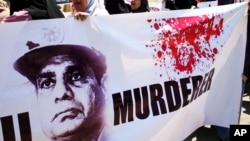Human rights organizations are calling on the United Nations to condemn what they say is worsening abuse in Egypt, and to investigate the killings of peaceful protesters in 2013. This appeal follows an assessment of Egypt’s human rights record under a regular U.N. review process.
Under the Universal Periodic Review process, U.N. member states have their human rights records examined by the U.N. Human Rights Council every four years.
Rights activists who attended Wednesday’s session in Geneva think Egypt got a fairly easy ride. This does not make them happy, considering what they allege are the crimes committed under Egyptian President Abdel Fattah el-Sissi.
The activists say a few strong interventions were made by some countries - notably the United States, Turkey, Norway and the Netherlands. Otherwise, they say, statements by members of the international community regarding Egypt’s repressive actions against its people were generally weak. The rights activists say they are particularly worried by the lackluster response of many European and Latin American countries.
The Egyptian government has set a deadline of November 10 for all non-governmental organizations to register under a highly restrictive law or face criminal charges. Human Rights Watch advocate Philippe Dam says this law is having a chilling effect on human rights defenders.
“There was actually no indication given by the Egyptian delegation today that this would be lifted. Today, a group of seven high-profile human rights NGOs from Egypt did publicly state that they decided not to participate in the UPR for fears of reprisal. Many NGO activists also recently left the country for fears of prosecution based on the 10th of November deadline, but also other threats and harassment," said Dam.
Similarly, Dam says there is no indication that the Egyptian government intends to release the report of the fact-finding commission established to look into the killing of more than 1,000 protesters in July and August 2013, following the ouster of the country's first freely-elected civilian President Mohamed Morsi. To date, he says the government has held no member of the security forces accountable for the killings.
The Egyptian authorities estimate they have imprisoned at least 22,000 people in unrest since the military, led by Sissi, removed Morsi from power in July 2013. The Egyptian Center for Economic and Social Rights, which has documented arrests by name and date, puts that number at 41,000.
Amnesty International researcher Nicholas Piachaud says Egypt is facing an unprecedented human rights crisis and its rights reputation is in tatters. He says many journalists and human rights defenders have been caught up in the government’s sweeping crackdown on political dissent.
Speaking on a Skype line from London, Piachaud says torture is rife in Egypt’s prisons and police stations. He says enforced disappearances are on the rise.
“Robust action is needed by the Human Rights Council to address Egypt’s human rights crisis. Right now, Egyptian human rights organizations stand on the brink of oblivion. It is going to need a concerted message from leaders in the Human Rights Council to check that crackdown. Otherwise, we could see a three-decade-year-old community which has championed the rule of law and fundamental freedoms wiped out in a heartbeat. Look, my message is very simple: We are not looking for more hand-wringing by the international community. We are looking for leadership," said Piachaud.
Other human rights organizations agree. They say it is important to keep up pressure on the Human Rights Council to take action against Egypt to reflect the gravity of the situation. They say Egypt cares about its international reputation, so it cares about what happens in Geneva.




